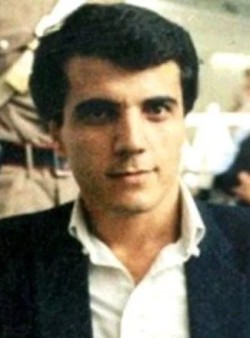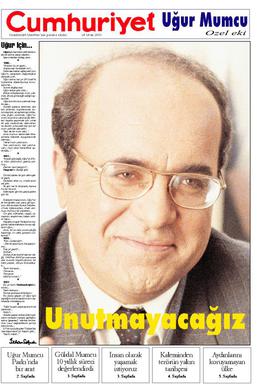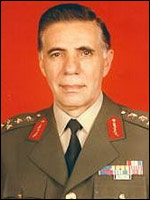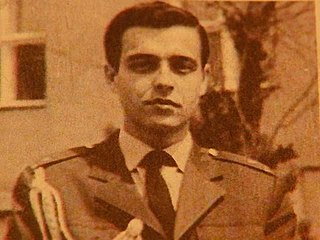Related Research Articles
Jandarma İstihbarat ve Terörle Mücadele or Jandarma İstihbarat Teşkilatı is the intelligence department of the Turkish Gendarmerie. JİTEM was active in the Kurdish–Turkish conflict. After the Susurluk scandal, former prime ministers Bülent Ecevit and Mesut Yılmaz have confirmed the existence of JİTEM.

Abdullah Çatlı was a Turkish secret government agent, as well as a contract killer for the National Intelligence Organization (MİT). He led the Grey Wolves, the youth branch of the Nationalist Movement Party (MHP), during the 1970s. His death in the Susurluk car crash, while travelling in a car with state officials, revealed the depth of the state's complicity in organized crime in what became known as the Susurluk scandal. He was a hitman for the state, and was involved in the killings of suspected members of the Kurdistan Workers' Party (PKK) and the Armenian Secret Army for the Liberation of Armenia (ASALA).

Mehmet Kemal Ağar is a Turkish former police chief, politician, government minister and leader of the Democratic Party. He was a police officer who rose to General Director of the General Directorate of Security, serving from 1993 to 1995, before entering parliament and serving as a government minister in 1996. Under his reign a close relationship developed between the deep state in Turkey, the Grey Wolves, and the Turkish mafia. It took 15 years until he was tried and sentenced for criminal activities relating to the 1996 Susurluk scandal; he was incarcerated in April 2012 but already released on probation in April 2013.
Reis Sedat Peker is a Turkish mafia boss and whistle-blower who has made various allegations about Turkish politicians and numerous government engagements in illegal activities through his own YouTube channel. He has described himself as a pan-Turkist and Turanist.

Uğur Mumcu was a Turkish investigative journalist for the daily Cumhuriyet. He was assassinated by a bomb placed in his car outside his home.
The Susurluk scandal or Susurluk accident, was a 1996 political scandal in Turkey that exposed a close relationship between the Turkish government, the ultra-nationalistic paramilitary Grey Wolves organization and the Turkish mafia. It took place during the peak of the Kurdish–Turkish conflict in the mid-1990s.
Musa Anter, also known as "Apê Musa", was a Kurdish writer, journalist and intellectual. Anter was assassinated by Turkish JITEM in September 1992.
Ergenekon was the name given to an alleged clandestine, secular ultra-nationalist organization in Turkey with possible ties to members of the country's military and security forces. The would-be group, named after Ergenekon, a mythical place located in the inaccessible valleys of the Altay Mountains, was accused of terrorism in Turkey.

Eşref Bitlis was a general in the Turkish Gendarmerie, who died in a controversial plane crash.
Mehmet Eymür was a Turkish intelligence official. In 1995–1996 he led the counter-terrorism department of the National Intelligence Organization (MIT), which he joined as a student in 1965 as a "pursuit officer". He was the right-hand man of MIT deputy undersecretary Hiram Abas.

Tuncay Güney, code name "Ipek" (silk), is a Turkish citizen of Dönmeh Jewish origin who claims to have infiltrated the Turkish Gendarmerie's intelligence organization JITEM, Ergenekon, the Workers' Party, and the Gülen movement before being outed. He is subordinate to Mehmet Eymür, who was discharged from the National Intelligence Organization. The information Güney has gleaned on these organizations make him a key figure in the ongoing Ergenekon investigation. His statements form the backbone of the 2455-page Ergenekon indictment, which mentions him 492 times and labels him a suspect at large.
Osman Gürbüz is a Turkish criminal. He was detained in the frame of the Ergenekon investigation for some unsolved murders.
Mehmet Ali Birand was a journalist, political commentator and writer.
Veli Küçük is a retired Turkish brigadier-general. He is thought to be the founder of the JİTEM intelligence arm of the Turkish Gendarmerie, and is accused by the Turkish government of being the head of the Ergenekon organization, based on testimony by Tuncay Güney. He was arrested in January 2008, and on 5 August 2013, sentenced to two consecutive life sentences.

Ahmet Cem Ersever was a commander in the Turkish Gendarmerie, and said to be one of the founders of the Gendarmerie's JITEM intelligence unit. He was assassinated in November 1993. His girlfriend and translator Nevval Boz was also assassinated, along with İhsan Hakan, a former PKK member.
Abdülkadir Aygan is a former member of the Kurdistan Workers' Party (PKK) and of the Turkish Gendarmerie's JITEM intelligence unit. He has been described as "the most well-known among PKK members turned informants". He is a refugee in Sweden since 2001, where he has been cooperating with prosecutors in the Ergenekon trials.
Tarık Ümit was a Turkish intelligence official in the National Intelligence Organization (MIT). He was kidnapped and murdered in March 1995.
Mehmet Avni Özgürel is a Turkish journalist, author and screenwriter. He was writing for the newspaper Radikal. According to Today's Zaman, he is "known for his close ties to Turkey's National Intelligence Organization". He has interviewed Murat Karayılan of the Kurdistan Workers' Party (PKK).
Kaşif Kozinoğlu was a senior Turkish intelligence official in the National Intelligence Organization (MIT). He died of an apparent heart attack in prison, shortly before he was due to give evidence in the Ergenekon trials, in which he was considered a suspect. His death was considered suspicious and investigated by prosecutors.
Osman Nuri Gündeş was a Turkish intelligence official in the National Intelligence Organization (MIT). He was chairman of the MIT's Istanbul region, retiring in 1986. He was later chief intelligence adviser in the mid-1990s to Prime Minister Tansu Çiller.
References
- 1 2 Sabah , 7 January 2012, Yeşil yaşıyor?
- ↑ Cebe, Özgur (28 December 2008). "'Yeşil'e mahkeme bulunamıyor". Siyaset. Milliyet . Dogan News Agency. Archived from the original on 4 March 2016. Retrieved 17 August 2024.
{{cite news}}: CS1 maint: unfit URL (link) - ↑ Today's Zaman, 16 September 2013, Former MİT officer claims JİTEM hitman ‘Yeşil' still alive Archived 2014-11-11 at the Wayback Machine
- ↑ Today's Zaman, 22 December 2011, Parliament reopens case of most notorious state hitman Archived 2016-03-04 at the Wayback Machine
- ↑ Today's Zaman, 7 December 2011, Former MİT official Eymür puts blame on former police chief Ağar for extrajudicial killings Archived 2013-12-30 at the Wayback Machine
- ↑ Today's Zaman, 2 December 2011, MİT official says he ‘knows much’ about past atrocities Archived 2013-12-30 at the Wayback Machine
- ↑ Today's Zaman, 11 April 2012, MİT admits to using hitman ‘Yeşil’ four times Archived 2013-12-31 at the Wayback Machine
- ↑ Today's Zaman, 14 May 2006, JITEM Wanted to Kill Birand Archived 2013-12-30 at the Wayback Machine
- ↑ Today's Zaman, 3 November 2011, ‘Shady gang inside state was behind 1990s Kurdish businessmen’s assassinations’ Archived 2016-03-04 at the Wayback Machine ,
- ↑ Kesler, Musa (30 December 2008). "Eymür'le ters düşen öldü". Güncel. Milliyet (in Turkish). Retrieved 6 January 2009.
- ↑ Kesler, Musa (27 December 2008). "Yeşil'in yanında bir bakan vardı". Güncel. Milliyet (in Turkish). Retrieved 6 January 2009.
- ↑ Today's Zaman, 9 October 2013, JİTEM list provided in Anter murder trial to be kept confidential Archived 2013-10-30 at the Wayback Machine